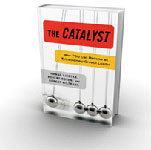What We're Reading Now
30 May 2011
As memories of strategy case studies and cold calls* came flooding back, Rachel re-read The Catalyst: How YOU Can Become an Extraordinary Growth Leader by Darden professor Jeanne Liedtka and coauthors Robert Rosen and Robert Wiltbank. (It's nice to know that learning continues long after you leave the classroom.)
Tags:
A few weeks ago, about 100 former classmates and I gathered in Charlottesville to celebrate our 10-year Darden reunion. It was great fun reminiscing about business school antics and catching up on our adventures since, but I'll confess it also left me a little hungry for the rigor of the classroom. Fortunately for me, I don't have to go any further than my bookshelf to get a taste of what I've been missing.

Simply by reading the book jacket, you might have a few guesses about why The Catalyst is right up my alley. I encounter very few commercial clients who wouldn't like a little growth, so current research about growth strategy is pretty useful. Furthermore, growth and creativity are often intertwined, and I'm always on the lookout for new ways to help people tap into their ability to think differently. Last but certainly not least, Liedtka exemplifies the type of professors who help Darden earn its reputation for outstanding faculty, and I'd probably be willing to at least skim anything with her name on the cover.
Part case study, part theory and part how-to, The Catalyst examines how some managers in established organizations and stable or declining industries achieved remarkable organic growth. (If you're tired of the business school jargon already, organic growth simply means that it's growth from within rather than through a merger or acquisition.) Based on interviews with identified growth leaders, the research conducted by Liedtka and her coauthors suggests that many common beliefs about growth leaders are misleading if not downright wrong.
At the top of the list of growth misconceptions is the notion that most innovation happens in special think tanks or organizations that have eliminated bureaucracy to spur innovation. In fact, the growth leaders profiled in The Catalyst don't spend time thinking about the greener grass in other organizations and instead reframe the constraints and strengths of their own organizations to spot customer-centric opportunities. Thankfully, there are plenty of real-life examples ('case studies' in business-school-speak) and specific tools to help readers adopt the powerful methods of the growth leaders.
One downside of compelling business writing is that your brain is likely to dive right in, jot notes in the margins and start thinking about work. So while it's a lot more fun than your average textbook, I don't suggest that you pick up The Catalyst for your beach or poolside reading this summer. Save this one for the return trip from vacation or a book club with colleagues — or any time you want to learn about growth or scratch an itch for business school. It does the trick, no cold call required.
*A cold call is a traditional aspect of many business and law school classes; at the beginning of each class period, the instructor selects a student to present his / her analysis of the assignment and open the class. It strikes fear in the hearts of many.







Comments
Our Comment Policy:
Our blog posts are only half of the conversation. What our readers have to say is equally important to us, and we're grateful for all the comments that continue the dialog.
To ensure that the discussion here is as useful as possible to all of our readers, please be respectful of our contributors and refrain from harassing, threatening and/or vulgar language. We reserve the right to screen and remove any comments from the site. If you have a question about a comment or want to discuss our policy, please contact us. We'll talk it over.
There are no comments for this entry yet.